Losing your property in Nebraska can be devastating. When you don’t have the capacity to pay for your mortgage, your home may be foreclosed. Giving up your home in Omaha for Foreclosure should be the last resort, which means you need to explore all the possibilities before giving up your property.
As a non-judicial foreclosure state, Nebraska’s legal system enables you to take possession of the property without going through the court process. However, in most cases, you’ll foreclose only after a power of sale gives you that right.
Nebraska is a title theory state where, when a homebuyer defaults on their mortgage payment, the property title remains in trust until the underlying loan is paid in full. Because there is no right to redemption and the power of sale provisions in trust deeds is faster than judicial foreclosure, lenders use this mechanism to foreclose on properties.
The Nebraska Trust Deed Act provides for non-judicial foreclosure, which is accomplished by transferring title to a property via a power of sale contained in the deed of trust. This allows for a faster foreclosure process than the alternative judicial method, which involves foreclosure through the court system and includes the right to redeem.
Nebraska also has judicial foreclosures, which allow mortgages that serve as liens on real property to be foreclosed through the courts. This method allows for a right to redemption and takes longer to implement.
Lenders use this option when it comes time to repossess homes because borrowers cannot pay their mortgages or other loan obligations. If this situation arises and your lender wants to foreclose on your property using a power of sale. In that case, they’ll send notice via certified mail informing you about their intent and instructions on how best to proceed with the foreclosure process.
Any home for foreclosure in Omaha must take place properly and according to Nebraska laws so that all parties involved are protected by them (i.,e., there are no loopholes). Nebraska is a non-judicial foreclosure state, which means you can foreclose without going to court. In most cases, however, you will foreclose only after a power of sale gives you that right.
The first step in the process of home foreclosure in Omaha is to obtain a lien or mortgage on the property involved. Once this has been done, an unsatisfied judgment is rendered against the owner (in most cases). It’s time for your attorneys to initiate proceedings by preparing and recording documents stating why they believe those documents were recorded correctly and how they should be enforced based on those recordings. This includes filing any necessary notices with local government agencies as well as notifying other interested parties about what steps are being taken so their rights aren’t violated by incomplete or improper filings made by others who may have interests in purchasing or otherwise receiving title from someone who owns real estate located within Nebraska’s borders.
In most cases, you’ll only foreclose after a power of sale gives you that right.
In most cases, you’ll only foreclose after a power of sale gives you that right. A power of sale is a legal document that gives you the right to foreclose in Nebraska. You must follow the state’s law to foreclose. If you don’t follow it, your foreclosure may be dismissed, and your lender could lose its rights to collect on its mortgage loan or property deed.
Below are needed to obtain a power of sale:
- Before initiating a foreclosure, the lender must record with the register of deeds a notice of default. A copy of the notice of default must be sent to the borrower and other junior lien holders along with those who have requested notice 10 days after the recordation of the notice of default.
- Twenty days before the foreclosure sale, a notice of foreclosure sale must be sent to the borrower and all interested parties. The sale takes place at a place, time, and manner noted in the notice of sale.
- Generally, a Notice of Trustee’s Sale is published for five consecutive weeks, with the last publication at least ten days but no more than thirty days before the sale. If there is no borrower address in the trust deed and no request for notice is made in the loan documents, then notice must be published three times—once a week for three weeks. Publication must begin within ten days after a Notice of Default is filed.
For lenders to foreclose on a property using the Nebraska Trust Deeds Act, they must include a power of sale language in the trust deed. They should seek judicial foreclosure if they do not include this language.
In a judicial foreclosure, the property is sold as part of a publicly noticed sale. When this happens, a lis pendens and complaint are filed. A lis pendens refers to recorded information that notifies the public that a specific property is being foreclosed upon.
What are the documents that establish a Nebraska mortgage?
If you get a loan to buy a home in Nebraska, you’ll likely sign two documents: a promissory note and a deed of trust. The promissory note is the contract containing your promise to repay the loan and other legal requirements included in the document. The deed of trust is very similar to a mortgage and gives the lender a security interest in the property; it will probably have a power of sale clause. If you fail to make payments, this clause gives the lender the right to sell your property non-judicially so it can recoup its money.
How long does the average foreclosure take in Nebraska?
It generally takes 90-120 days to complete an uncontested non-judicial foreclosure. A judicial foreclosure can take up to six months, and the borrower may be able to delay a sale for up to 9 months. It can take longer if the borrower counters the action in court, finds ways to delay and postpone sales, or files for bankruptcy.
Federal law requires a mortgage servicer to wait at least 120 days after a borrower is behind on payments before initiating foreclosure. However, if the servicer determines that you have violated a due-on-sale clause or if it is joining in the foreclosure action of another lienholder, it can begin the foreclosure process sooner. (12 C.F.R. § 1024.41)
Foreclosure laws can be complex. Lawyers and servicers have failed to complete foreclosure steps or make errors in foreclosure. You might have a defense that forces a restart or gives you leverage to negotiate alternative solutions.






